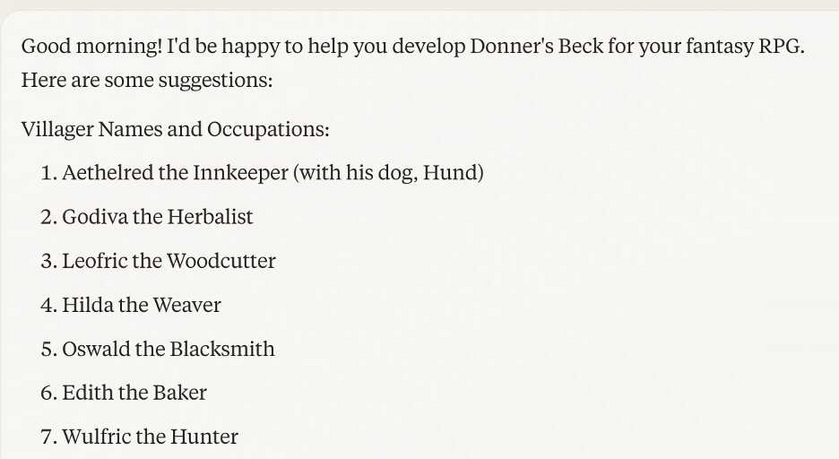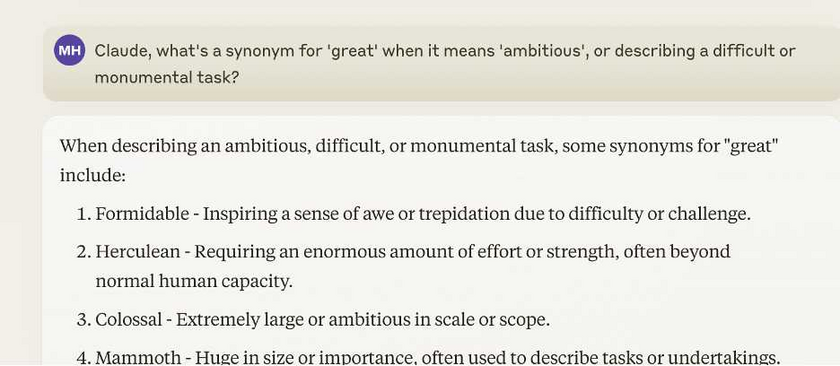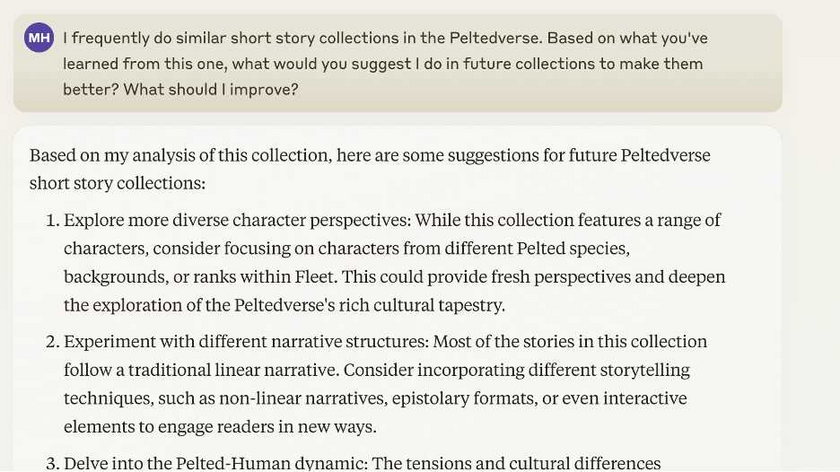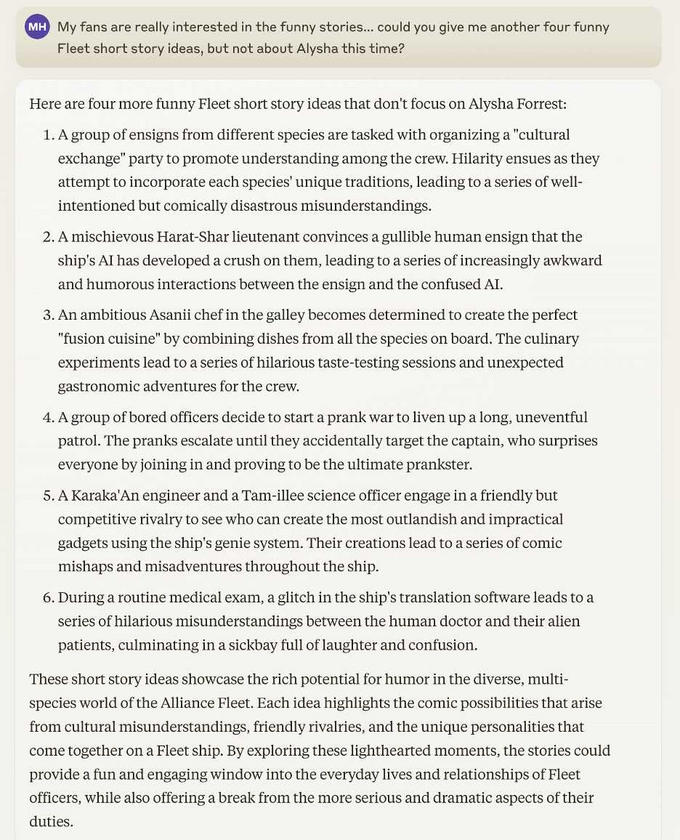AIs as Creative Assistants: the Continuing Adventures of Cyborg Jaguar (Patreon)
Content
My AI experiment continues, frens! The first few days, where I fed Claude financial and marketing information and used it to generate everything from reader discussion guides to revenue projections were wild and obviously valuable. But I didn’t want to spend forever dancing around the claims that LLMs are useful as creative assistants as well. So I have been confronting my misgivings directly, coming up with scenarios and then prodding myself about my reactions with leading questions.
How is this different from brainstorming story ideas with a friend who’s read my work?
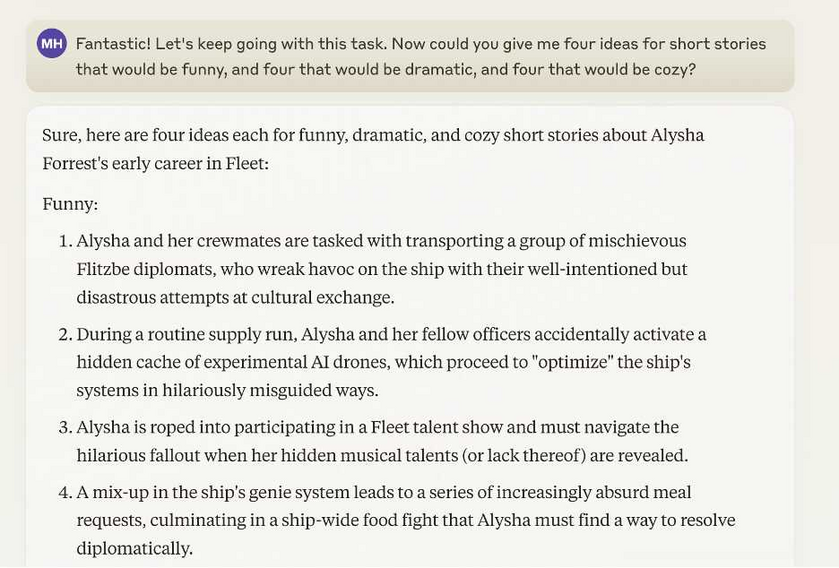
How is this different from me doing two separate searches, one for ‘Anglo-saxon names’ and one for ‘jobs in a medieval village’?
(Also, lol, naming the dog literally ‘dog’.)
How is this different from using a thesaurus?
How is this different from getting beta reader reports of errors? (cut off to prevent too many spoilers! I gave it the current Peltedverse book in progress!)
How is this different from polling for feedback?
…and this is just a selection of things I’ve tried.
A lot of damage was created by my first encounter with AI being “the worst kind of tech guys taunt visual artists about how easy they are to replace”… and I still have qualms, particularly about the legalities and licensing of art (visual or otherwise) by living creatives in a position to benefit from their copyrights. I can see dazzling possibilities, like “license AI to write you a new Peltedverse novel featuring your character, using the style and tropes and setting of M.C.A. Hogarth!”… but I can also see “oops, we made that part possible without teaching people to expect they should pay the creator of that IP.”
And of course, this whole endeavor leads me to ask the inevitable existential questions: am I replacing human interaction in my life with a computer? If the AI is trained on an enormous sum of records of human interactions and written thoughts, have I actually replaced the human interaction, or am I taking advantage of a broader selection of ideas, all originated by humans, but retrieved by the AI? What actually is happening behind the prompt window? On one hand, I’d prefer to brainstorm with an actual friend, get feedback from living beta readers, and have my actual audience fill out my polls. In the real world, though, friends don’t always have any ideas (and aren’t always available), beta readers don’t catch everything (and also aren’t always available), and the percentage of people who fill out my polls makes the results a reflection of my superfan community, not the broader readership. And search results are tedious to compile across multiple topics, and thesaurus sites are often crammed with ads and load slowly. Plus, I often have to scroll and scroll to remember the word I’m looking for, which has some nuance that can’t be easily summarized.
So it’s obvious that even in the most basic ways, AI is a constructive tool for the creative side of the process as well. But then I get to ask: if I use AI to do something as simple as come up with 20 Anglo-saxon names for me, do I now have to say that I’ve used AI to write my book? How much work should an AI do (and what kind) before you need to disclose that you’ve used AI while writing it? Is using AI as a glorified search engine sufficient cause? If so, it won’t be long before everything is ‘AI-written.’
We have so many questions to ask, and the answers aren’t going to be clear-cut. What is obvious to me is that as a tool, AI is such a tremendous force-multiplier in everything I’ve tried that there’s no going back. I said on X that just like there was a me before the internet, and a me after, there is now a me before AI, and a me post-AI. This is a watershed moment, and not just for me, but for everyone. And for once, I’m going to grapple with it early, instead of waiting to get rolled over by it…!
And now, for fun – which of the funny stories would you read? XD
